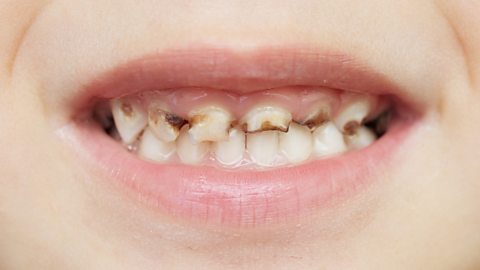Dental caries

Dental caries is caused when plaque bacteria combine with sugars in food to produce acids that erode tooth enamel.
This plaque acid is produced when free sugars in food and drinks react with and dissolve the minerals on the enamel.
What causes dental caries?
Dietary factors contributing to dental caries
- Diet high in sugar and fizzy drinks – A diet high in sugary food and drinks provides the plaque bacteria with the sugar they need to use as energy to release acid. This eventually dissolves the enamel and causes dental caries.
- Regular snacking – After eating or drinking, acid can attack the enamel for over an hour. This can cause dental erosion which means enamel is lost from the surface of the tooth and this increases the risk of dental caries.
Lifestyle factors contributing to dental caries
- Poor oral hygiene – If the teeth are not brushed twice a day, plaque can soften the enamel and bacteria can reach the dentine (the softer tissue under the enamel). This speeds up the process of developing dental caries.
- Avoiding the dentist – Visiting the dentist improves oral hygiene, as you can gain advice on dental health and have your teeth checked to spot early signs of decay.
Dietary advice to manage dental caries
- A reduced sugar diet – Limit the intake of sugar from food and drinks to no more than 24g per day for children and 30g per day for adults. Ensure your diet is high in calcium to help build strong tooth development and protect against dental caries. Drink water with meals as this increases production of saliva, which neutralises the acid.
- Avoid snacking – By reducing snacking, you reduce the production of acid in the mouth, decreasing damage to the enamel. It is recommended that, if sugary foods are to be eaten in small amounts, it should be at meal times.
Lifestyle advice to manage dental caries
- Good oral hygiene – Teeth should be thoroughly brushed twice a day and flossed to remove any build up of plaque. Visiting the dentist every six months is also recommended to maintain a good standard of oral health. Fluoride is important for the development of teeth and protection against acid damage, so using toothpaste with added fluoride is advised.